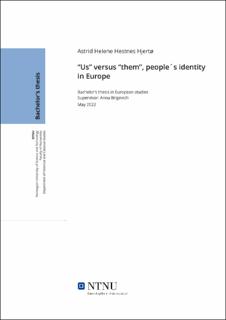“Us” versus “them”, people´s identity in Europe
Bachelor thesis
Permanent lenke
https://hdl.handle.net/11250/2998924Utgivelsesdato
2022Metadata
Vis full innførselSamlinger
Sammendrag
Nasjonalisme og populistisk tankegang har hatt en økende tilslutning i Europa i løpet av de siste to tiårene. Flere var av den mening at globalisering ville lede til at den nasjonalistisk identiteten ville utviskes, og deretter bli erstattet med en kosmopolitisk europeisk identitet. Dette har ikke skjedd. Istedenfor virker det som om globalisering har bidratt til å øke folks nasjonale identitet, og også ført til en økende nasjonalisme. Denne besvarelsen vil søke å forklare hvilke identitetsfaktorer som påvirker folks nasjonale identitet og folks europeiske identitet sterkest. Med grunnlag i Henri Tajfel´s social identity theory, viser denne oppgaven hvordan effekten av “oss” versus “dem” er sterk når det gjelder nasjonalisme, og dermed også populisme, og har manifestert seg i narrativet “vinnere” og “tapere” av globaliseringen. Denne besvarelsen viser at det er visse faktorer som alder, utdanning og folks (europeeres) geografiske bosted som ofte er i fokus når nasjonal og europeisk identitet debatteres. Samtidig viser besvarelsen også andre elementer som har sterkere innvirkning på folks identitet; religion, økonomi og politisk tilhørighet. Data fra Eurobarometer 508 report, en rapport som viser data basert på ca.27000 EU-borgeres svar på spørsmål om hvor sterkt de identifiserer seg med ulike identitetsfaktorer, er benyttet for å forklare dette. There has been an increase in nationalist and populist sentiments in Europe during the last two decades. Some believed that globalization would lead to the eradication of national identity, that it would be replaced by a cosmopolitan European identity. This prediction has not come to pass. In fact, it seems that globalization has actually increased the appeal of national identity and has led to increased nationalism. This thesis will explain what identity factors that influence people`s national identity and that of being European, the most. This thesis will use Henri Tajfel's social identity theory to explain how the notion of “us” versus “them” is strong, concerning how nationalism, and by extension populism, has manifested itself in the narrative of “winners” and “losers” of globalization. It is argued in this paper that certain variables such as age, education and geographical location of people (of European citizens) are often in focus of a discussion regarding people`s national identity and European identity, presenting that there are other elements such as religion, economy and political affiliation that have a stronger impact on people's identity. This is done by looking at data from the Eurobarometer 508 report where roughly 27000 respondents from the EU member states answered survey questions about how strongly they identified themselves with different identity factors.
